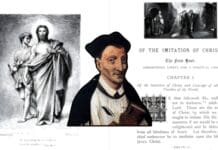The Parable of the Master and Servant, found exclusively in Luke’s Gospel, teaches us what it means to do your duty as a Catholic!
This lesser-known parable reveals the spirit of humility and obedience expected of Christ’s followers:
[Luke 17]
{17:7} But which of you, having a servant plowing or feeding cattle, would say to him, as he was returning from the field, ‘Come in immediately; sit down to eat,’
{17:8} and would not say to him: ‘Prepare my dinner; gird yourself and minister to me, while I eat and drink; and after these things, you shall eat and drink?’
{17:9} Would he be grateful to that servant, for doing what he commanded him to do?
{17:10} I think not. So too, when you have done all these things that have been taught to you, you should say: ‘We are useless servants. We have done what we should have done.’ ”
In this parable, Jesus presents a familiar scenario: a servant working in the fields all day, only to return and continue serving his master without expecting special treatment. The master does not offer thanks for the servant’s efforts, as the servant is simply fulfilling his duty.
Jesus emphasizes that even when one has done all that was commanded, they should say, “We are useless servants. We have done what we should have done.”
This parable teaches true service to God is marked by humble obedience without seeking reward or recognition. No matter how virtuous or diligent we are, we can never place God in our debt. Our actions should be seen as fulfilling our responsibilities as God’s servants.
With this parable, Jesus conveys that serving God and others selflessly is fundamental to Catholic life. It challenges us to embrace humility, understanding that service is not about gaining favor but about faithfully performing one’s duty!
God, have mercy on me, a sinner.
🙏
Editorial credit: Renata Sedmakova / Shutterstock.com



















